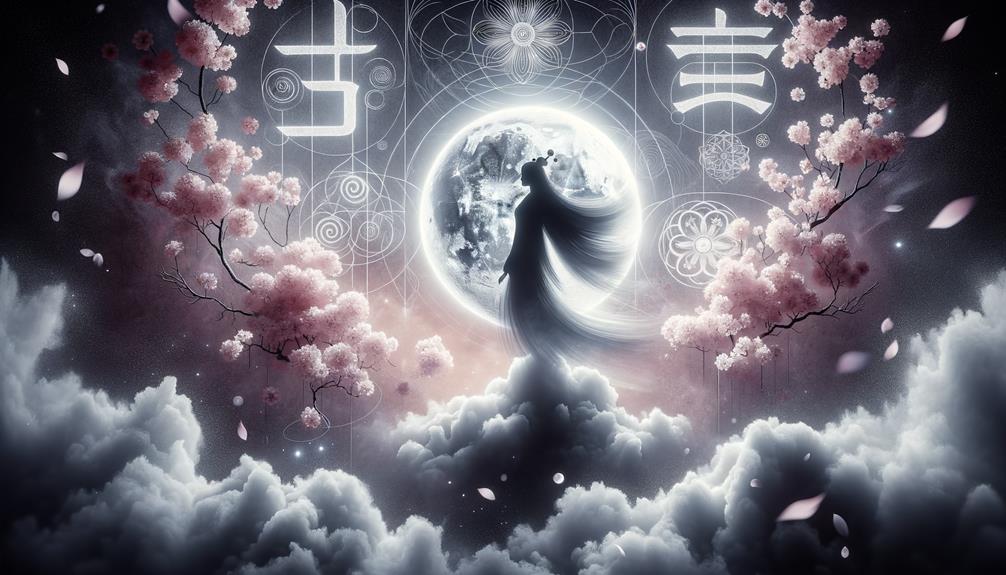Tsukuyomi is a fascinating character in Japanese lore. The story goes that this celebrated moon god sprang from the right eye of Izanagi, the original male deity. He's notorious for his fallout with his sister, Amaterasu, the sun goddess. This sibling rivalry reshaped the natural world.
One of his most captivating myths tells of a dramatic face-off with Uke Mochi, the goddess of food. It didn't end well, to say the least. Tsukuyomi's tale serves as a powerful metaphor in Shintō, illustrating the fine balance between light and dark.
There's a lot more to Tsukiyomi's story, though. For those keen on delving deeper into the world of mythology, his full tale is a real treat. So, why not dive in? There's plenty of intrigue to be found in the details.
Birth and Origins of Tsukuyomi
Well, let's chat about Tsukuyomi, who is a pretty fascinating character from Japanese mythology. Can you believe this moon and night god literally came out of the right eye of another god, Izanagi? Talk about having an eye for talent! This quirky birth story puts him square in the middle of the Shinto pantheon, making him a key player in these ancient tales.
Tsukuyomi's got some pretty famous siblings too, including Amaterasu, the sun goddess. They're like the yin and yang of the natural world. Once upon a time, they were married, which made sense, right? Day and night, sun and moon, it's a perfect match. But a few twists and turns in their story led to their split, which completely reshaped how the natural world works. It's almost like their breakup is the reason why day and night are separate.
Then there's this other episode where Tsukuyomi paid a visit to the food goddess, Uke Mochi. But that's a whole different can of worms. The point here is, these stories show how big of a deal Tsukuyomi is in Shinto beliefs. People see him as the guy who's in charge of the moon and night, which is a pretty cool gig if you ask me. All these tales mix together mythology, symbolism, and cultural beliefs, making them real page-turners.
Tsukuyomi and the Food Goddess
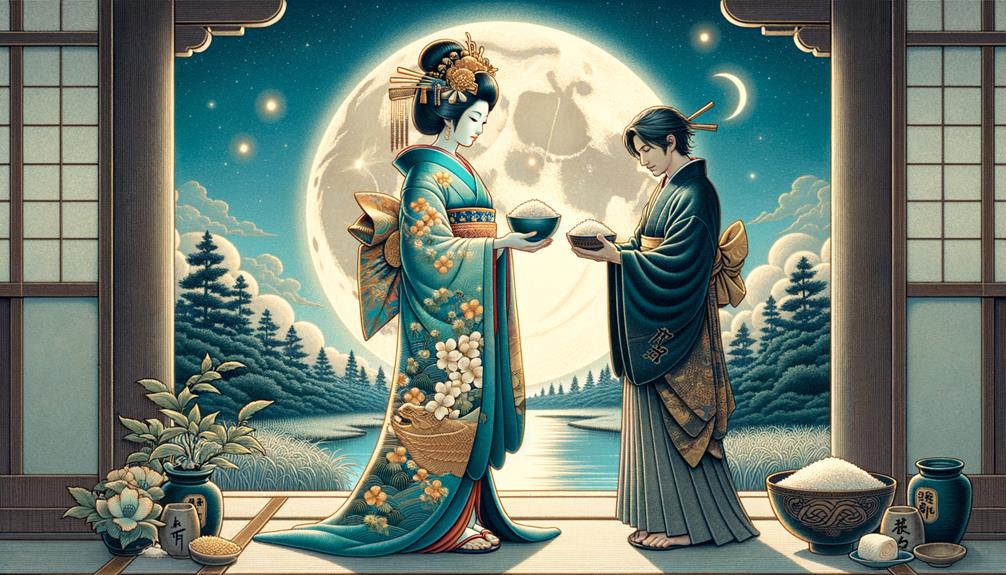
When we delve into the story of Tsukuyomi, the moon god, a noteworthy chapter is his unforgettable visit to Uke Mochi, the food goddess. This event is a major turning point in Tsukuyomi's journey.
Uke Mochi invited Tsukuyomi to a meal, but her peculiar way of creating food left him horrified. In his indignation, he ended up taking the life of the food goddess, a decision that had far-reaching implications. This incident wasn't just a blip; it sparked a significant change leading to Tsukuyomi's fallout with his sister, Amaterasu, who is the sun goddess. This breakdown in their relationship is key to understanding the concept of day and night in Japanese mythology.
The episode involving Tsukuyomi and Uke Mochi gives us a deeper understanding of the moon god's character and his sphere of influence. It's crucial to remember that this tale is a core part of Tsukuyomi's story, shaping his mythology. It brings to light his volatile temperament and his inability to tolerate what he deems as crude, paving the way for a significant natural phenomenon: the division of day and night.
Symbolism in Shintō Religion
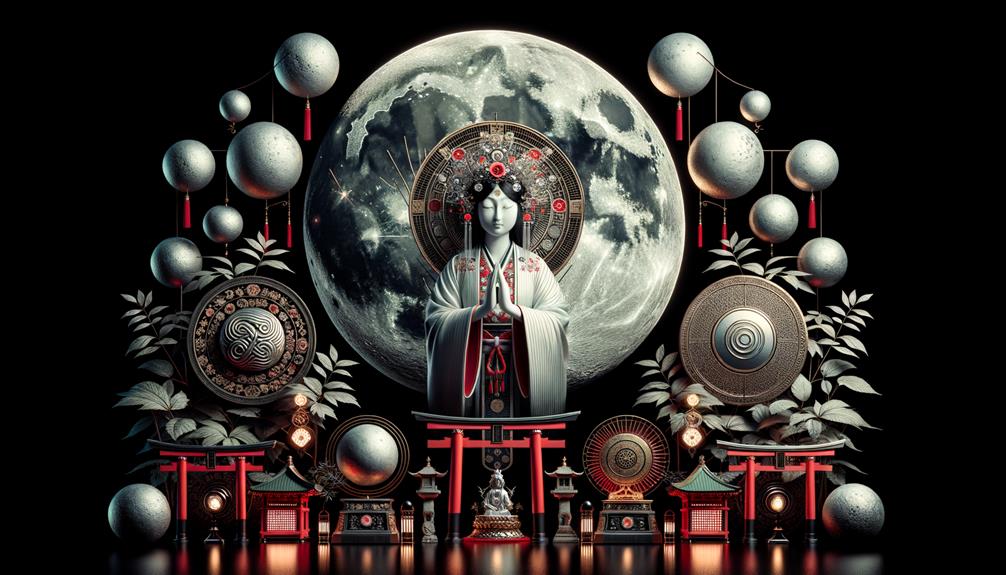
The moon god Tsukuyomi in the Shintō religion is more than just a celestial figure. He symbolizes the endless cycle of time, the delicate balance between light and dark, and the crucial role of boundaries and consequences. Think about it, his connection to the night isn't just about the daily rotation of day to night. It's about a deeper philosophical concept of balance – the constant dance between light and shadow, good and bad, life and death.
Remember when Tsukuyomi had that massive fallout with Amaterasu, the sun goddess? That happened after the death of Ukemochi no Kami, the food goddess. That story is a stark reminder that our actions have ripple effects, and in their case, it led to a permanent split between day and night. It's a lesson in the importance of balance and respecting limits.
When Tsukuyomi went to see Ukemochi no Kami, it represented the deep link between the divine and earthly realms. It's a nod to the belief that gods play a hands-on role in shaping our natural world and emphasizes the role of celestial bodies in Japanese spirituality. And don't forget about Tsukuyomi's role in ritual purification. That's a core belief in Shintō, underlining the necessity of spiritual cleanliness and respect for nature to maintain universal harmony.
Tsukuyomi in Ancient Records
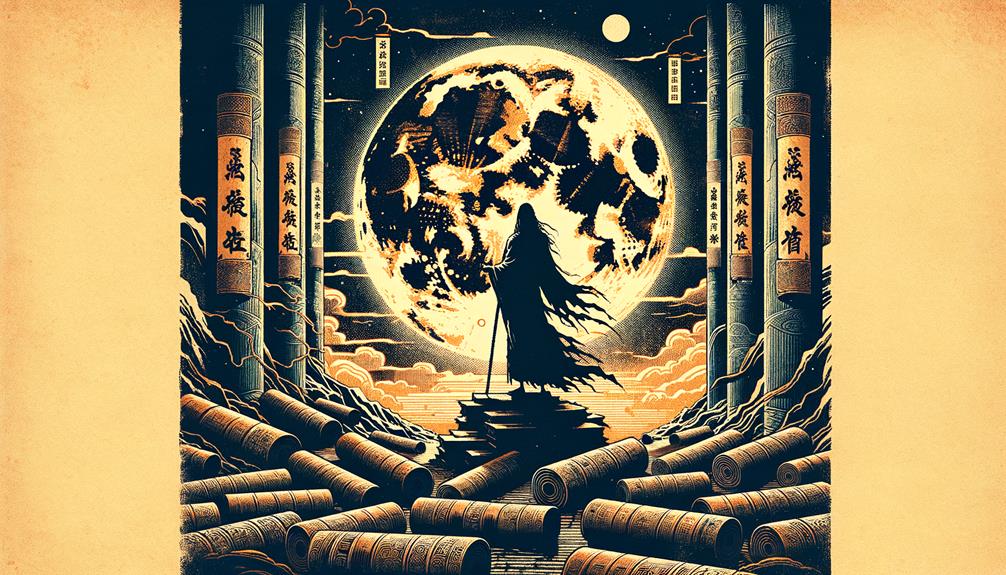
Jumping into the old records, we see that Tsukuyomi, who was brought into existence from Izanagi's left eye, holds a remarkable position in Japanese mythology as the moon god. His tale, deeply rooted in ancient traditions and symbolism, beautifully narrates his duty, honor, and the unfortunate outcomes of thoughtless actions.
Let's casually discuss Tsukuyomi's role by highlighting four key elements:
- Birth: Tsukuyomi's birth from Izanagi's left eye confirms his divine birth and his significance among the gods.
- Mission: Tsukuyomi's sister, the sun goddess Amaterasu, sent him to meet Ukemochi no Kami, the goddess of food. This demonstrates his role as a reliable representative of the sun goddess.
- Conflict: During his visit, Tsukuyomi makes the grave mistake of killing Ukemochi no Kami, an unnecessary act of brutality that leads to a substantial fallout.
- Consequences: This act results in his eternal isolation from Amaterasu, symbolizing the division of night (moon) and day (sun).
These events not only set Tsukuyomi's role as the moon god but also underline his prominence in the ancient Japanese records. His tale is a testament to the complex and often stormy interactions among the Shinto gods.
Tsukuyomis Influence in Popular Culture
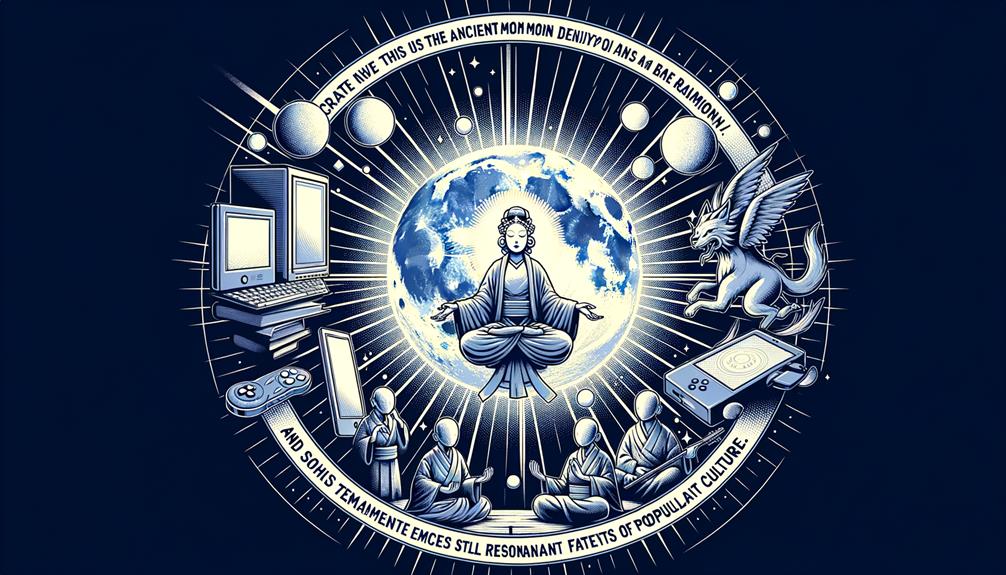
Turning our gaze from historical accounts to today's interpretations, it's clear that the influence of Tsukuyomi, the mythical moon deity, is strikingly evident in popular culture, notably in numerous anime series and video games. The enduring charm and versatility of Tsukuyomi's character have allowed it to be imaginatively reimagined in many modern works, even challenging traditional gender norms at times.
Take for example, the light novel 'Tsuki ga Michibiku Isekai Douchuu,' where Tsukuyomi plays a significant role as a deity, underscoring the character's relevance in today's stories. In the popular anime 'Naruto,' Tsukuyomi is not a character but a potent genjutsu technique, symbolizing the deity's transformation into a representation of strength.
Here's a quick overview of Tsukuyomi's cultural impact:
| Medium | Name of Work | Role of Tsukuyomi |
|---|---|---|
| Light Novel | Tsuki ga Michibiku Isekai Douchuu | Deity |
| Anime | Naruto | Technique |
| Anime | Tsubasa Chronicle | Character |
| Video Game | Shin Megami Tensei | Demon |
In the 'Tsubasa Chronicle' anime, Tsukuyomi is a featured character, while in the 'Shin Megami Tensei' video game series, the moon god is portrayed as a demon. These instances underscore Tsukuyomi's sustained cultural significance, showing us how ancient mythology continues to spark creativity in modern pop culture.
Frequently Asked Questions
What Is the Moon in Japanese Myths?
The moon holds a special place in Japanese mythology. It's more than just a celestial body – it's personified as the god Tsukuyomi. The story goes that Tsukuyomi was brought to life from the right eye of the deity Izanagi. Tsukuyomi's actions were responsible for splitting day and night apart. This tale is a testament to how influential the moon is thought to be in our daily lives.
Is Tsukuyomi a Good God?
Talking about Tsukuyomi, it's not so simple to label him as a 'good' or 'bad' God. Known as a moon deity in mythology, his character is layered, and his actions can be seen as both commendable and questionable. Take, for instance, the incident where he killed Uke Mochi. This act certainly raises questions about his moral compass, suggesting his nature is more complex than just being a divine figure. His character is multifaceted, and that's what makes him intriguing.
Why Does Amaterasu Hate Tsukuyomi?
The reason Amaterasu holds a grudge against Tsukuyomi has its roots in a major dispute they had. You see, Tsukuyomi did something that Amaterasu found utterly disrespectful. He killed Uke Mochi, who happened to be the goddess of food. Amaterasu saw this act as a total betrayal, which caused a big rift between them. As a result, they decided to part ways, which in turn led to the separation of day and night.
Why Did Tsukiyomi Get Angry With the Food Goddess?
You know, there was an incident when Tsukuyomi, the Moon God, got really ticked off with Uke Mochi, the goddess of food. It all came down to the way she prepared food – it was a bit, well, unconventional to say the least. She had this knack of producing food from different parts of her body, which didn't sit well with Tsukuyomi at all. He found it utterly gross and offensive, and this sparked his anger towards her.

